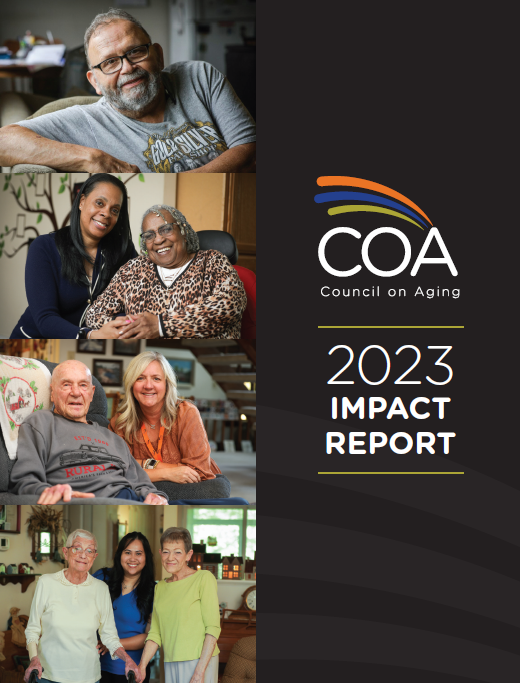Below are the full stories from Council on Aging’s 2023 Impact Report. Click the links below to jump directly to the article you wish to read.
- COA 2023 advocacy activities result in significant wins for COA constituents
- Strong partnerships win the day following major provider termination
- COA staff service projects highlight community partnerships
- Hamilton County’s innovative 513Relief Bus transports COA specialists into the community
- AddnAide: Blanche looks for a home helper, finds a new friend
- home52 Transportation success driven by partnerships with provider network
- Partnership leads to national recognition for innovative changes to local meal programs
- COA team helps clients navigate complex Medicaid journey
- Community-based partnerships bring health and wellness programs to older adults and caregivers
- 2023 a big year for recognition of COA innovation
COA 2023 advocacy activities result in significant wins for COA constituents
One of the most important functions of Council on Aging (COA) in its efforts to serve older adults, caregivers and those with disabilities in southwestern Ohio is to advocate on their behalf. The agency works continuously to identify and strategically address issues that may impact the health and well-being of these constituents.

In 2023, COA led and participated in many important advocacy efforts throughout the state that have the potential to result in positive outcomes for thousands of Ohioans. COA’s success in these efforts can be attributed to the agency’s strong reputation among local and state elected officials, as well as strong partnerships both within and out of Ohio’s aging services network.
With Ohio’s 2024-2025 budget set to be approved by Gov. DeWine by July 1, COA participated in a statewide collation of advocates focused on securing budget increases for state Medicaid waiver programs serving older Ohioans and those with disabilities.
The impetus was an on-going national shortage of homecare workers, including home health aides, whose critical work enables vulnerable Ohioans to remain safe and independent in their homes. Aides also help fill in gaps in care for family caregivers who are juggling multiple responsibilities. Homecare workers have left their jobs due in part to relatively low hourly pay rates.
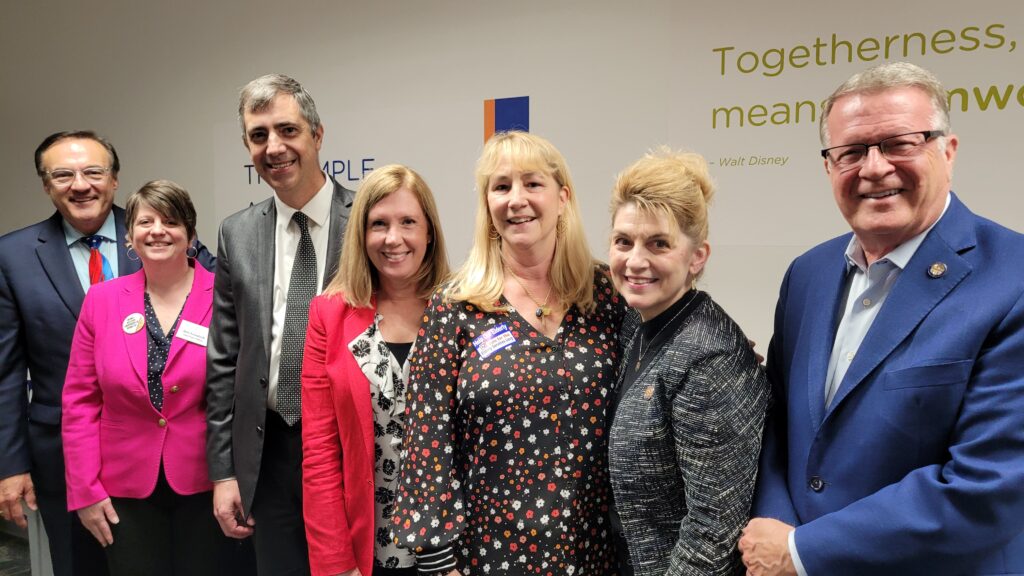
To help shape its advocacy strategy, COA hosted a roundtable with elected officials to let them hear firsthand from people directly impacted by the workforce shortage, including home health agencies, family caregivers, older adults and home health aides themselves.
“The message was clear,” said COA Government Relations Manager Nan Cahall. “Homecare workers deserve higher, competitive wages and we should be looking for opportunities in state-run programs to eliminate rules and requirements that drive up costs without improving outcomes for older adults.”
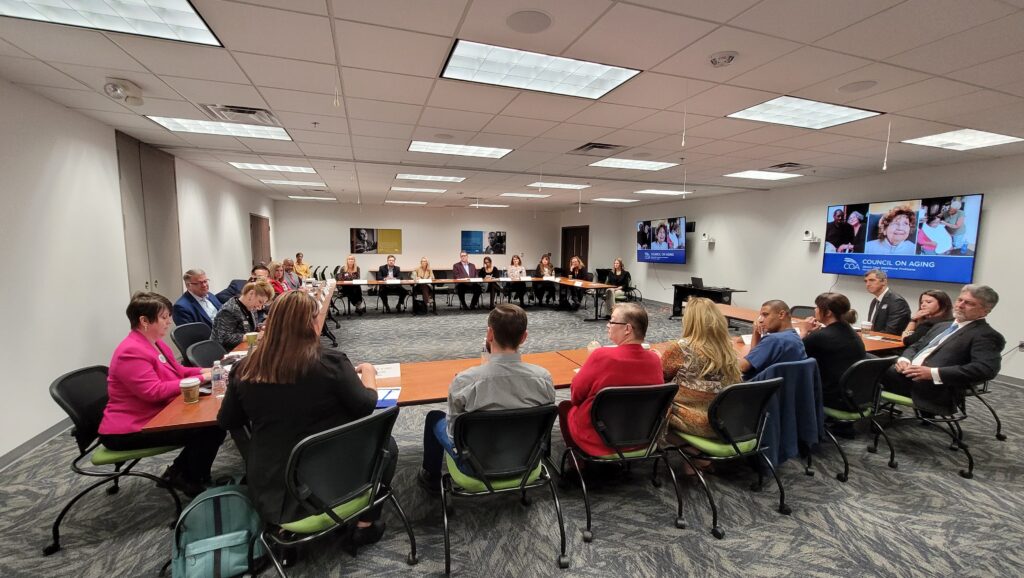
COA participated in a social media campaign, led by the Ohio Association of Area Agencies on Aging (o4a), to educate state legislators and keep the issue top of mind as they worked on the state budget. Additionally, Cahall actively communicated with local legislators about the issue, and testified before the Ohio House Finance HHS Subcommittee in Columbus.
The coalition’s efforts were a success, with the final budget including funding for hourly pay increases for home health aides in Ohio’s Medicaid waiver programs. Additionally, the budget included increases for reimbursement for home-delivered meal providers, adult day services and the Assisted Living Waiver program, a Medicaid program that allows individuals to live in an assisted living facility.
“As a result of this, we’ve seen more interest from providers in getting back into this space, which is good news, because we’ve had a shortage of providers,” said Ken Wilson, COA’s vice president of program operations.
In another effort to help ease the effects of the workforce shortage, COA and its subsidiary home52 developed AddnAide, an app that allows older adults who need and qualify for in-home care services to connect with people in the community who are willing to provide that care. AddnAide expands the consumer directed care model, where older adults in some of COA’s programs can hire and manage their own homecare workers. Since its limited launch in 2022, AddnAide has helped older adults who might have waited months to match with an aide through a traditional homecare agency connect with people in the community who want to work as paid caregivers. AddnAide has expanded the pool of available homecare workers to include everyday people the community, including stay at home parents, students, gig and part-time workers and people who are interested in helping to fulfill a societal need.
COA has begun readying the app to license to other Area Agencies on Aging (AAAs) in Ohio. As part of this effort, COA determined Ohio’s rules around personal homecare providers required more specificity to ensure AddnAide would be able attract a large pool of homecare candidates. Cahall initiated conversations with legislators to amend the current rules to ensure personal homecare providers (such as those who might use AddnAide to find work) would not be required to hold a state license. While the services aides provide (cleaning, laundry and meal prep for example) are vital to ensuring older adults can remain in their homes safely as long as possible, they are not medical in nature.
As a result, language was added to the state rule that exempts from home care licensure individuals who would provide services to an older adult hiring them directly through AddnAide and other consumer-directed programs.
“During conversations with our legislators, I worked to ensure they understood the importance of AddnAide in opening a non-traditional channel for older adults to hire aides, and that over-regulation could hinder the innovative program’s success in Ohio,” Cahall said.
COA’s 2023 advocacy successes did not occur in a vacuum; they are due in part to the agency’s year-round relationship-building and advocacy efforts, which are supported by its Board of Trustees’ Community and Government Relations Committee.
“We have an excellent reputation in southwestern Ohio and throughout the state, and we work hard to continually build and strengthen our relationships with legislators throughout the year,” Cahall said.
For example, Cahall, members of COA’s leadership team and the Community and Government Relations Committee, and others held 15 meetings with state legislators from COA’s service area. The group also organizes and attends visits by local lawmakers to the homes of clients.
Additional 2023 advocacy highlights:
- COA successfully led efforts to change the Ohio revised code so that therapeutic home-delivered meals (meals made with specific nutritional requirements for those with diabetes, heart disease, and other health conditions) no longer require a “diet order” (prescription) from a licensed healthcare professional. The requirement was often time-consuming, and clients sometimes did not have a healthcare provider who could provide the prescription. Without this requirement, programs are realizing cost savings with care managers no longer required to spend extra time coordinating the prescription, and clients are receiving the appropriate nutrition without delay.
- COA led advocacy efforts in conjunction with o4a and Ohio’s AAAs to ensure AAAs will maintain their roles in MyCare Ohio as the state plans the program’s statewide expansion. MyCare Ohio is a managed care program for Ohioans who receive both Medicaid and Medicare benefits. Through MyCare Ohio, members have all their health and long-term care coordinated through a state-approved health plan. Since the program began in 2014, COA has partnered with Aetna Better Health of Ohio and Molina Healthcare of Ohio to provide long-term care coordination services to members in southwestern Ohio.
- As part of its new budget, the Ohio Department of Aging awarded Healthy Aging Grants to each Ohio county, to be administered by county governments for programs and services for older adults. COA has strong, long-term relationships with county leaders in Butler, Clinton and Hamilton counties, as well as vast experience administering programs for older adults in these counties and unparalleled knowledge about the needs of older adults in its service area. COA proactively made recommendations to county commissioners on how to use the grant dollars to address some of the most urgent unmet needs of older adults in their counties. Each of the four counties agreed to COA’s proposals, and COA will in 2024 begin to administer programs in each county ranging from home repairs and modifications to utility assistance.
- COA provided support and/or testimony for four pieces of legislation designed to help older adults continue to afford their homes in the face of rising property taxes and other challenges. COA Board Chair Dr. Karen Bankston and Cahall each testified in favor of several of the pieces of proposed legislation.
- Hamilton County Prosecutor Melissa Powers created the county’s first Elder Justice Unit, with COA participating as one of the unit’s community partners.
Strong partnerships win the day following major provider termination
Partnerships play an important role in ensuring older adults receive the services they need to live safely and independently at home. Council on Aging (COA) is fortunate to have the support of a strong network of service provider partners who share in COA’s commitment to delivering high-quality services.
This partnership was put to the test – and passed with flying colors – in July when COA made the difficult decision to terminate its contracts with Central Connections.
Located in Middletown and formerly known as the Middletown Area Senior Services, Central Connections provided services including congregate and home-delivered meals, transportation and other supportive services to more than 1,300 older adults in Butler and Warren counties.
COA took this action as a result of several breaches of contract on the part of Central Connections which were connected to the organization’s financial stability and service delivery requirements. Before delivering termination notices on July 24, 2023, COA conducted dozens of site visits and repeatedly requested information which would bring Central Connections into compliance with its contracts.
Area Agencies on Aging, like Council on Aging, play an integral role in managing the provider network that delivers home- and community-based services to area older adults, including provider procurement, contracting and ongoing oversight and management. It is because of this relationship and oversight that COA was able to quickly identify and then begin monitoring concerns related to Central Connections.
In the weeks following COA’s actions, Central Connections’ executive director was terminated, most of its staff laid off, and the property was purchased by the city of Middletown. The building’s future remains uncertain. The issue received extensive local interest and media coverage.
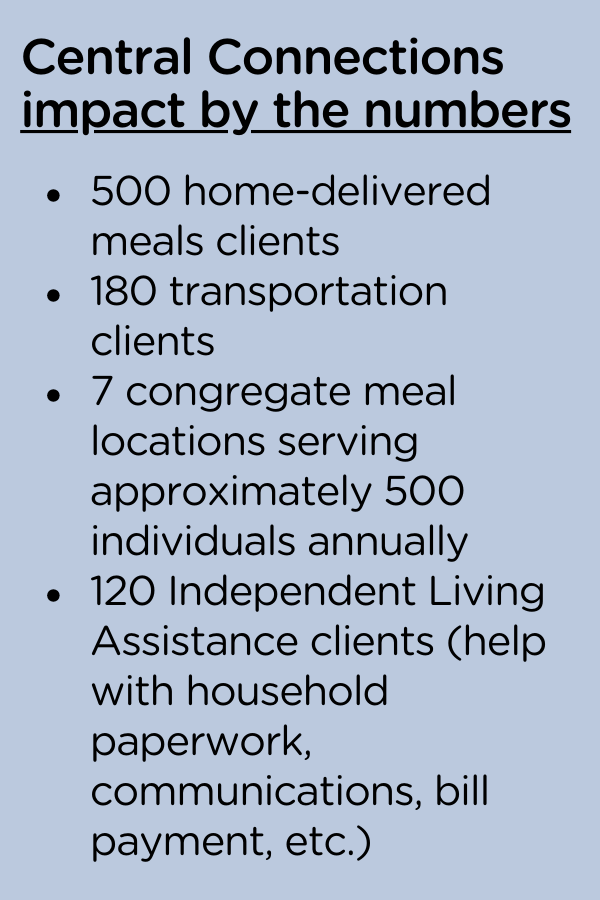
In the weeks leading up to and following the contract terminations, COA’s priority was ensuring the continuity of services for impacted older adults. COA’s provider relations department worked with a team of other contracted service providers to successfully transition all 1,300 clients who’d been receiving services from Central Connections.
The primary service providers involved in this transition included Meals on Wheels Southwest OH & Northern KY (Meals on Wheels), Community First Solutions and Warren County Community Services, Inc. (WCCS).
“Asking a service provider to take on new clients with very little notice is no small task,” said Jennifer Lake, provider services supervisor at Council on Aging. “We are fortunate that our provider network shares our commitment to ensuring clients receive their scheduled services. These providers demonstrated what true partnership is about – stepping in without hesitation to meet the needs of impacted older adults.”
Lake and other members of COA’s provider relations team worked with the three provider agencies, COA case managers and other community partners to prepare for the downstream impact of the contract terminations. This included:
- determining the appropriate provider to serve each of the 1,300 impacted older adults
- notifying each client about changes to their services and service provider
- transitioning clients to existing transportation and meal-delivery routes
- ensuring meal delivery to seven congregate meal sites previously served by Central Connections
“At every level, the staff at these organizations really came through for older adults,” said Ken Wilson, COA’s vice president of program operations. “From meal drivers to HR personnel, these service providers exceeded our expectations for responding to this situation. With very little notice, they responded to our call for help and demonstrated a level of professionalism and compassion I will not soon forget,” Wilson added.
To ensure clients experienced minimal – if any – disruption in their impacted services, a lot of work took place behind the scenes at the three provider organizations. According to Wilson and Lake, the providers: hired and trained staff; added routes; and rapidly expanded their capacity, including securing more supplies and equipment. Additionally, staff at these organizations accumulated a significant amount of extra work hours to ramp up for the transition and adjust to the increase service volume.
Warren County Community Services, Inc.
Staff at WCCS assumed some home-delivered meal deliveries, as well as Independent Living Assistance clients. The organization volunteered to take over the congregate meal sites – seven in all – that were once operated by Central Connections.

According to Amy Houpey, director of aging services at Warren County Community Services, it was the organization’s staff that made the difference during a difficult situation. “The staff were amazing. I really cannot say enough good things about them,” Houpey said. “Their response was one of concern and support. They were very concerned about the clients and the hardship they might be going through due to the interruption of their meals…everyone pulled together and asked what they could do.”
Community First Solutions
Community First Solutions supported the transition on many levels, including through its partner organizations Meals on Wheels of Butler County (Partners in Prime), LifeSpan (care management) and The Fleet (transportation services). The organization assisted with home-delivered meal deliveries, ultimately absorbed all the Independent Living Assistance clients and provided transportation services. Additionally, care management staff at LifeSpan played a critical role in contact impacted clients to answer questions and share information about their new service provider.

“This was an urgent and constantly evolving situation,” said Karen Dages, director of in-home services at Meals on Wheels of Butler County – part of Community First Solutions. “It was hard to know exactly the numbers and impact, and as ‘a few’ became ‘many’ additional clients, this impacted our routes, work flow and supplies.”
Dages stressed the importance of good communication during a crisis situation. “Constant and frequent communication with COA was key because everyone had bits and pieces of the story and we were all just trying to be flexible and give each other grace. Our focus was on serving the clients together.”
“We always strive to be good and faithful partners and this was an example of what and how we do it,” Dages added.
Meals on Wheels Southwest OH & Northern KY
Meals on Wheels stepped in to support both home-delivered and congregate meal delivery, taking on seven congregate meals sites until they could be permanently transferred to WCCS.
“Despite the obstacles, staff rose to the challenge to make sure that no meal was missed,” said Michael Beck, chief production officer at Meals on Wheels. “Several times, drivers took additional trips to cover those that may have fallen through the cracks or were added late. Office and support staff moved into more operational positions while keeping up with their original duties.”
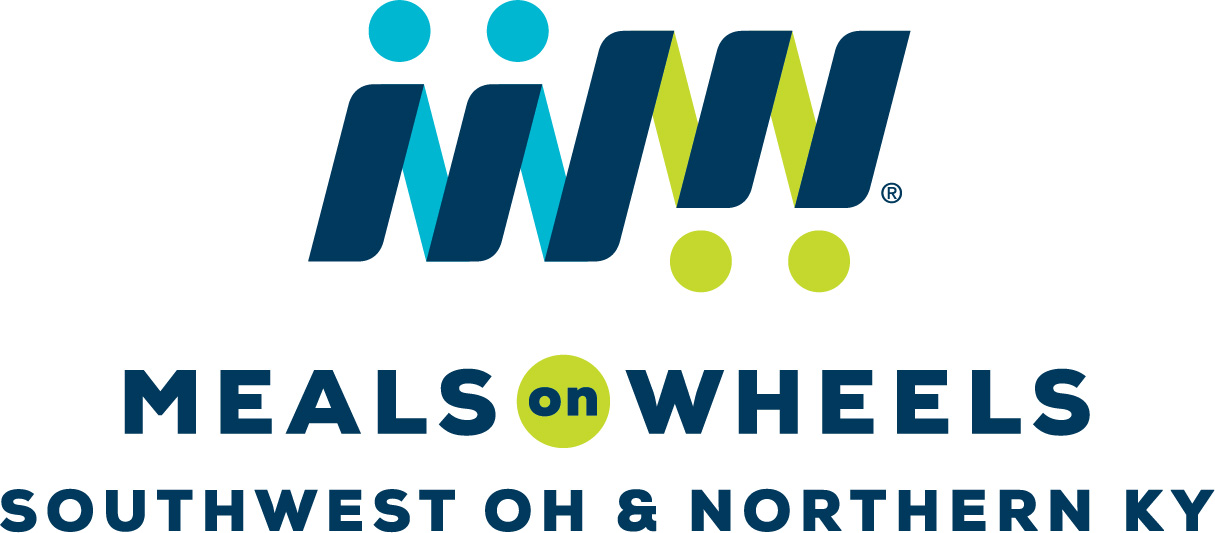
“We are proud of our staff’s overall response to a crisis situation that spanned an extended period,” Beck added. “We often speak of our mission to serve all seniors, and this was an impressive display of walking that walk.”
At COA, Lake said, “I was struck by the lack of hesitation on the part of these providers to step in and meet the need. I heard from these providers – and others who helped with this effort – that the clients were the most important part of this transition, and no one was prepared to let them go without services.”
Lake added that she was impressed with the level of commitment and creativity demonstrated by the providers to deliver the services while still meeting program requirements. She noted that the service providers committed to this work without the promise of clients being permanently assigned to their business.
One of the more challenging service needs to arise out of the contract terminations was congregate meals. Congregate meals play an important role in meeting both the nutritional and social needs of older adults. Central Connection had provided ready-to-serve meals at seven different meal sites in Butler County, including a meal that was no longer able to be served in the Central Connections facility. Here again, partnerships played a critical role in ensuring this service continued without interruption.
Warren County Community Services volunteered to take over the congregate meal sites but needed time to prepare. So in the meantime, Meals on Wheels stepped in on a temporary basis. This spirit of partnership helped to ensure the seven impacted sites received enough meals to serve the older adults who regularly attended.
Additionally, COA received offers of support from several individuals and community organizations to serve as an alternative site for the congregate meal that was previously served at Central Connections.
First Presbyterian Church, located just down the road from Central Connections in Middletown, opened its doors as a temporary congregate meal site. Additionally, COA worked with MidPointe Library, which hosts congregate meals at three of its branch locations, to raise awareness of alternative meal sites.
“MidPointe has been a tremendous partner to COA in allowing us to offer congregate meals in places where older adults are already gathering,” COA’s Wilson said. “It has always been our goal to find a permanent replacement for the Central Connections congregate meal site within the city’s limits. MidPointe came forward right away to discuss expanding the meal program to their Middletown branch to help meet the need in the community. We hope to begin offering a meal there in 2024.”
COA staff service projects highlight community partnerships
Council on Aging (COA) is committed to offering opportunities for staff to be involved and engaged in the community, beyond their daily work. This is accomplished through service projects offered during the year.
Staff service projects demonstrate the importance of building strong partnerships with other service-minded organizations in COA’s service area. Through these partnerships, COA is able serve older adults in ways beyond traditional programming. At the same time, service projects provide opportunities for COA staff to step outside their normal roles and departments to work with colleagues from other parts of the organization.
“Providing opportunities for our staff to participate in service projects speaks to a number of our core values, including compassion, service and teamwork,” said Jacqueline Hutsell, vice president of people services at COA. “Service projects are also important to our mission at COA because they create opportunities to build partnerships – both internally and externally – that help us better meet the needs of our community,” Hutsell added.
In FY 2023, COA staff participated in several service projects in partnership with other organizations, intending to support the needs of area older adults.

Spreading holiday cheer
In December 2022, COA partnered with Home Instead Senior Care to provide holiday cheer to older adults in five low-income senior apartment buildings. Called Be a Santa for a Senior, the program provided basic items such as cleaning supplies, pajamas and personal care items.
“This program is so much more than gift giving,” said Jane Ripberger, owner of Home Instead. “It’s about special moments and joy shared between older adults and their community. Partnering with COA has made the program a great success in our community.”
Staff from all programs, departments and teams purchased, organized, wrapped and delivered gifts to 242 individuals who might otherwise have gone without during the holiday season.
Fighting loneliness and isolation
In Spring 2023, COA partnered with Vantage Aging and Ohio Living Hospice to fight loneliness and isolation one letter at a time.

Through card-creating workshops, COA staff created 300 handwritten messages that included inspiration, encouragement and good wishes. The cards were then taken to Ohio Living Hospice and distributed to hospice patients.
Meeting the basic needs of vulnerable community members
In Summer 2023, COA partnered with Matthew 25: Ministries to collect personal care items for underserved older adults. Collection bins were placed throughout the building, and staff donated items such as towels and wash cloths, shampoo, and shaving cream. COA staff donated 300 items and Matthew 25: Ministries generously provided 1,000 pounds of product.
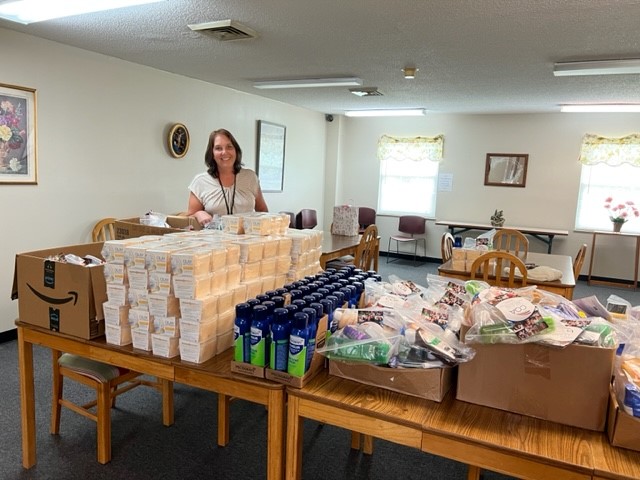
Items were delivered by COA staff to Salem House in Warren County, Corbly Trace and Mt. View Terrace in Hamilton County, and Blanchester Senior Center in Clinton County.
“Were it not for this partnership with Matthew 25, we couldn’t have helped as many as we did – we touched the lives of 200 older adults,” said COA’s Payroll Assistant, Sharon Weis, who led the coordination efforts for many of the organization’s service projects in 2023.
Hamilton County’s innovative 513Relief Bus transports COA specialists into the community
For decades, Council on Aging (COA) has been southwestern Ohio’s “front door” for information related to aging and aging services. Its Aging and Disability Resource Center (ADRC) is staffed by expert specialists who respond to more than 50,000 inquiries each year – mostly by phone or electronically.
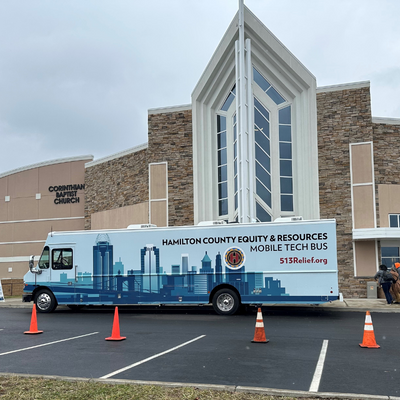
When Hamilton County announced the opportunity for partnerships on its new 513Relief Bus, COA responded and was selected. When COA first boarded the bus in early 2023, it opened a new channel for its specialists to interface with those in need of aging-related information and services: in person, and in tandem with other area social-service organizations.
“We are reaching people in a completely new way, that we’ve never done before,” said ADRC Manager Lindsay Hamm. “We’re getting our name out there and meeting people we wouldn’t meet otherwise.”
The bus – described as a “mobile medical and social services bus” – is an outgrowth of Hamilton County Commissioner Alicia Reece’s 513Relief.org effort that began during the pandemic to connect citizens to federal, state and local programs to help them find stability.
Equipped with the technology, spaces and handicap access needed to serve community members in person, the brand-new bus launched in January, and through September 30, a COA representative had been on-board for 47 stops, providing resources and information related to aging, disabilities and caregiving and screening for potential participation in COA programs.
Marshay Watson, an ADRC specialist who represents COA on most of its stops, appreciates the in-person time she gets with those who visit the bus. “It’s important to be able to see people face-to-face and ask questions,” she said. In all, COA assisted 275 individuals that the agency might not otherwise have had the chance to help.
Watson recalled the case of a woman named Bobbi who visited the bus at multiple stops but never asked for help. The third time Watson saw her, she initiated a conversation and Bobbi confided she needed help with her utility bill.
Watson immediately connected Bobbi with an on-site representative from Hamilton County Job and Family Services, who worked with Duke Energy to cancel Bobbi’s disconnection. While Watson had her attention, she registered Bobbi to receive $50 in free coupons to use at local farmers’ markets through the USDA Senior Farmers’ Market Nutrition Program, managed by Council on Aging.
Watson also shared the story of an older adult man who visited the bus looking for information about finding a job. Even though he did not originally visit to learn about COA services, she observed he had a difficult time climbing the stairs to enter the bus and was able to approach him and suggest she screen him for COA programs.
From the standpoint of many older adults visiting the bus, they appreciate being able to talk to someone in-person rather than having to navigate technology to complete a website form or wait on hold to speak to someone by phone.
“To find help, sometimes you call different places and don’t get to talk to a real person. You get a voice recording,” said Faye, a recent visitor to the bus. “That can be frustrating, especially for older people.”
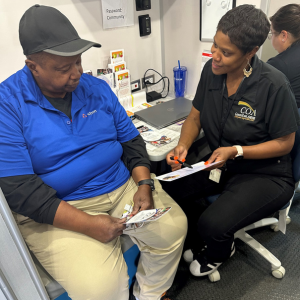
Faye originally visited the bus to have her blood pressure checked and happened to meet Watson. “Marshay was right there, and we connected,” she said. “It was a godsend when she started talking to me about the farmers’ market program. She’s such an active listener. She has such a warm heart,” Faye said.
Caregivers also stop by the bus for information. Allan, who visited clad in his work uniform, consulted with Watson about help available to care for his wife, for whom he is the primary caregiver. Watson walked though caregiver program information with him, and he promised to discuss the options with his wife.
Whether or not Allan and his wife pursue services through COA, they now are informed about their options. The same can be said for the hundreds of others who have met Watson on the bus this year.
“This is a tremendous resource Hamilton County commissioners have made available to county residents,” said Council on Aging CEO Suzanne Burke. “We appreciate the opportunity to have a seat on the 513Relief Bus and to be able to connect with older adults where they live and work.”
Blanche looks for a home helper, finds a new friend
AddnAide brought these two former nurses together; compatibility and common goals did the rest
Thursday isn’t just the day of the week Blanche’s charming home in Kennedy Heights gets spruced up. It’s also when she gets to spend time with her friend Bonita.
Both women look forward to it. And for Blanche, 89, it’s an important factor in being able to remain in her home, where she has lived since 1963. After all, she jokes, “I raised two kids and a husband here.”
During weekly visits, Bonita mops, cleans the bathrooms and organizes – tasks that had become difficult for Blanche on her own. Most importantly, Bonita said, she dusts and vacuums.
“Blanche has asthma, so that’s important, because dust is one of her triggers,” she said.
The housekeeping help was exactly what Blanche, a retired nurse, was looking for when she reached out to Bonita through AddnAide. The app provides an alternative to traditional homecare agencies, allowing older adults (enrolled in select Council on Aging programs) who need help with household tasks such as laundry, errands and meal prep to match with people in the community who are willing to provide that care.

As for the companionship and fast friendship formed since they matched on AddnAide? Well, those were unexpected bonuses, much to the delight of both women.
In the face of a regional and national shortage of traditional homecare workers, Council on Aging (COA) and its subsidiary home52 decided to take an innovative approach to the problem, debuting the app in July 2022. Blanche learned of AddnAide after her COA case manager reached out to let her daughter, Linda, know about the new service.
Linda lives just a five-minute drive from her mother and is deeply involved in helping with her care; ensuring that Blanche has the home help she needs is an important part of that. Since having open-heart surgery in 2008, Blanche has received housekeeping help through COA, but with the shortage of people seeking work as homecare workers, that assistance was sometimes difficult to maintain.
She and her daughter were excited about the app’s potential to address the shortage by attracting caregivers — those with experience in the field and those with an interest and a heart for the work, but no experience. They have not been disappointed.
AddnAide is expanding the pool of potential homecare workers in our region. It is ideal for people seeking a flexible schedule, including stay-at-home parents, retirees, students, community-minded individuals and those with other employment. To create an AddnAide account, you must be 18 years old, have transportation and complete a required background check.

At the end of FY 2023, more than 130 individuals in the community had signed up to be a paid caregiver in AddnAide and completed the required background checks.
For Bonita, the opportunity to supplement her income with flexible work was appealing, but what really motivated her to sign up as a caregiver through AddnAide was the promise of purpose-driven employment. Like Blanche, she worked for decades as a nurse, with a special focus on gerontology. She maintains her nursing license and has secured additional related certifications because it’s important to her to be part of the solution to the care gap.
“It’s a real crisis in Ohio,” Bonita said. “I encourage so many people I know to sign up to be a caregiver through AddnAide.”
She has found AddnAide to be user-friendly. She created her account, then worked with COA’s third-party financial management firm, Palco Inc., on her background check. Once her profile became visible to older adults, they began contacting her.
Blanche, meanwhile, worked with Linda to create her profile and relies on her to schedule appointments and approve Bonita’s timecards through the app. Older adults (or designees) serve as employers for caregivers; payroll and tax functions are built into AddnAide. At the end of FY 2023, more than 200 COA clients, like Blanche, had active AddnAide accounts.
When Blanche was searching for a potential caregiver on the app, she was attracted to the fact that Bonita shared her background as a nurse. Both women also appreciated the fact that the other’s profile included a photo, which gave them an added sense of security. And there was another factor.
After Blanche reached out through AddnAide and she and Bonita chatted there, they exchanged phone numbers and talked. Next, they met at the library to get more comfortable with each other, before finally beginning their professional relationship.
The rest, as they say, is history. In their first year of their new working relationship, Blanche has been able to feel safe and happy in her home, and Bonita has enjoyed contributing to the solution for the caregiver shortage.
Blanche is an accomplished singer who has performed with the Cincinnati Symphony Orchestra/CSO Pops Classical Roots Community Choir. She still performs with the Loretta C. Mangram Chorale with Greater Liberty Baptist Church, and Bonita has even taken her granddaughter to some of Blanche’s performances.
Maintaining an essential caregiving relationship while building a friendship – now that is a song that both Bonita and Blanche love to sing.
home52 Transportation success driven by partnerships with provider network
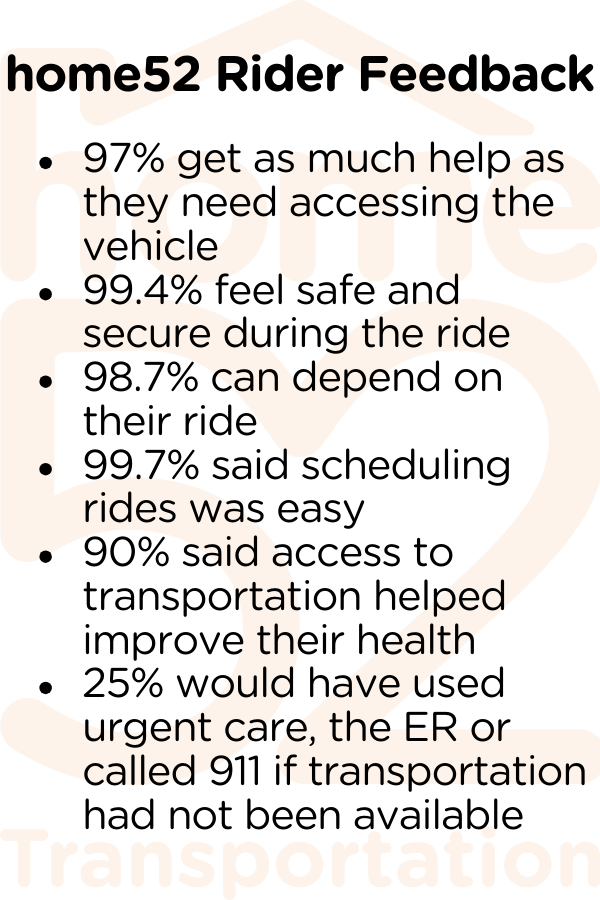
After nearly three full years of operations, home52 Transportation continues to receive high marks from riders who rely on the service to meet their transportation needs.
Launched in May 2021 by Council on Aging and its subsidiary, home52, home52 Transportation coordinates multiple transportation providers through a centralized transportation coordination center, providing on-demand and advance-scheduled trips for riders who require specialized transportation services. The goal of home52 Transportation is to provide the right type of vehicle, at the right time, with the right support to meet an individual’s needs.
Bryan Black, COA’s transportation program manager, attributes the program’s success in large part to the partnerships home52 has developed with its transportation providers.
“home52 Transportation is committed to meeting the unique transportation needs of older adults and individuals with disabilities,” Black said. “The transportation providers that are part of our network share this commitment and it is evident in the level of service they provide to our riders.”
Timmons Tender Care, owned by Annie Timmons, is one example.
Timmons said she was attracted to home52 Transportation based on a shared goal of empowering individuals to remain independent in their homes. “I felt a connection to this,” she said, adding the program’s model of “through the door, not to the door,” is what separates home52 Transportation from other transportation options in the region.
Timmons’s husband, Lannis, is a driver for the company. A retired schoolteacher and basketball coach, the act of helping others and providing a service that supports the community gives him a sense of fulfillment. “I take care of myself so I can take care of others,” Timmons said. “This is important to me.”
According to Black, home52 Transportation is ideal for small businesses because there is low administrative overhead for the provider. “Providers don’t need office staff or scheduling software. We manage all of that and provide the training and support needed to help our providers succeed,” Black said.
“From our first meeting, it was clear the home52 Transportation staff wanted our small company to succeed,” Annie Timmons said. “They walked us step by step through the process of applying to become a provider. It was a good experience for us as a small company.”
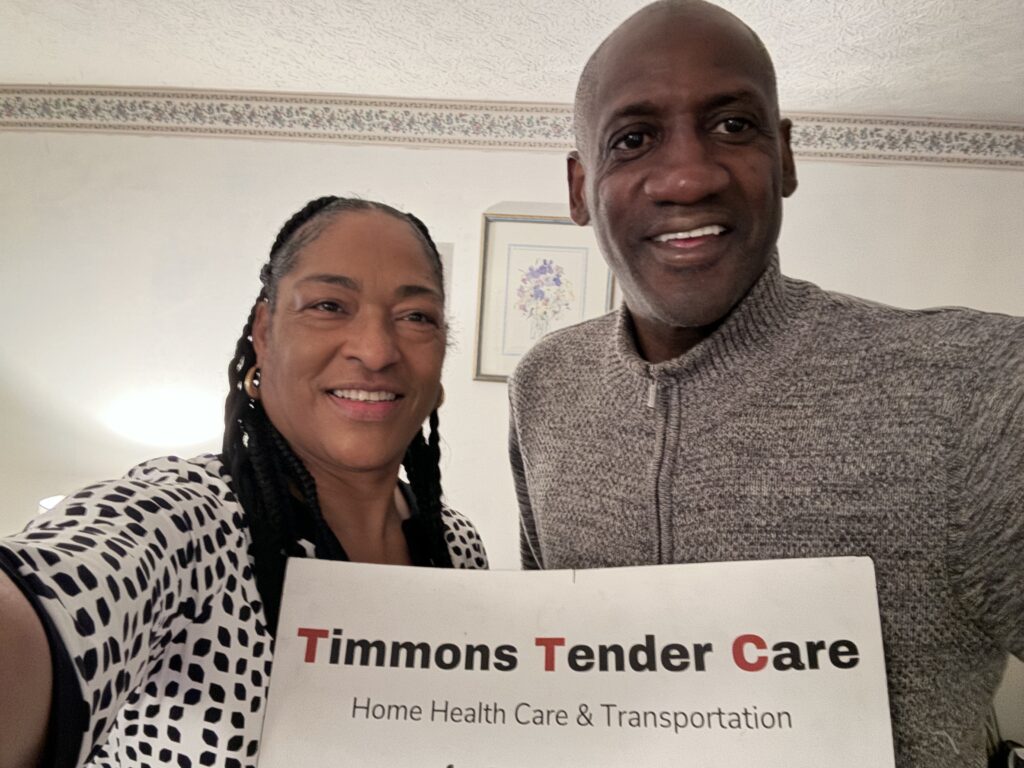
“All we ask of providers is that they provide a good driver, a safe vehicle and a high level of customer service for our riders,” Black added.
For the Timmons, this commitment to customer service was evident at every level of home52 Transportation. “home52 Transportation does a great job with customer service. The call center, office staff, everyone… is very warm and welcoming.”
“It’s great working with small businesses and family-owned companies like Timmons Tender Care,” said Black. “These providers understand the personal touch that’s required when working with our riders. It is a true partnership.”
Partnership leads to national recognition for innovative changes to local meal programs
In 2023, Council on Aging (COA) and its partner, the Live Well Collaborative, received a first place 2023 dmi:Design Value Award from the Design Management Institute (DMI). The award acknowledges organizations that have made significant contributions to the field of design and have demonstrated a commitment to improving people’s lives through design excellence. COA and Live Well received the award for work on a project that sought to redesign the way meal programs are delivered to older adults through select Council on Aging programs.

COA serves nearly 2 million annually to older adults in southwestern Ohio. However, meals programs nationally have faced significant challenges due to the growing aging population, increased demand caused by the pandemic, the rising costs of goods and services, and other changes within the meal-delivery industry. To overcome these challenges, COA partnered with the multidisciplinary team of faculty and students from the University of Cincinnati’s Live Well Collaborative to conduct a holistic review of the program with an eye towards modernization. The project became known as Meals and More.
“The recognition of a first-place Design Value Award is a reflection of COA’s commitment to transformational change in the way it provides services to older adults,” said Linda Dunseath, chief operating officer and executive director at Live Well. “The Meals and More program is a prime example of this. COA’s proactive approach to addressing the increase in the aging population, plus addressing nutritional and social needs exemplifies its commitment to addressing its constituents’ needs.”
The Meals and More team focused on evaluating COA’s existing home-delivered meals and congregate meal programs funded by Title III of the Older Americans Act and county senior services tax levies (Elderly Services Programs), identifying opportunities for improvements and new services, creating and refining program and service specifications, and developing an implementation strategy. The team also held a summit that included community chefs, restaurant and healthcare representatives, as well as current contracted providers of the meal programs. The summit was followed by a focus group to discuss key opportunities and implementation barriers.
“When it comes to meals and many other home- and community-based services, the older adults we’re serving today want more choice and control in their daily routine,” said Ken Wilson, COA’s vice president of program operations. “At the same time, we’re faced with unprecedented demand for services and increasing costs. The Meals and More project helped us look at our meals program through a modern, innovative lens and will help position us to provide more, high-quality options for older adults in the future.”
The Meals and More project generated several innovative ideas that COA will look to implement across its provider network now and in the coming months and years, including:
- The addition of grocery delivery services (i.e., Boost/Instacart) for grocery ordering and delivery to homebound clients.
- Increasing the number of congregate meal locations where meals are prepared on-site (vs using prepackaged meals) with new a la carte items such as salad bars.
- The addition of restaurant-style congregate meals prepared by local chefs and restaurants to offer options such as Asian, Mediterranean, southern soul food, and American homestyle meals.
- Expanding existing home-delivered meals providers into new territories to offer older adults additional choice in their meal provider.
- Advocated for state and federal rule changes that would allow flexibility for clients to select regular or therapeutic meals to meet their dietary needs.
- Partnering with meal providers to offer more meals at community-based locations such as local libraries.
- Innovating with providers to decrease food waste, enhance freshness and expand options for congregate meal participants to use e-cards at area restaurants.
“Live Well has been partnering with COA since 2019 to bring new and innovative approaches to the way they provide services to older adults in Southwestern Ohio,” said Live Well’s Dunseath. “What has made this relationship so special is the passion COA associates have for the work that they do by co-creating solutions with us that are truly life changing.”
About the award
The 2023 dmi:Design Value Awards recognize teams that have delivered significant value through excellence in Design or Design Management practices. The 2023 Design Value Award winners are exemplars in their fields; they are a distinguished list of organizations that include non-profit entities, government agencies, large multinationals, and regional enterprises.
COA team helps clients navigate complex Medicaid journey
The road a typical Medicaid waiver client travels from their first contact with Council on Aging (COA) to the program where they will remain for the long term is often long and complex. It’s a difficult road for individuals to navigate on their own. Fortunately, COA has many experts on its team to guide applicants through this process. It’s a partnership that brings together several COA departments, external partners, individuals and their family members, all with the goal of ensuring clients receive the care and support they need to live in the environment they prefer – most often their home.
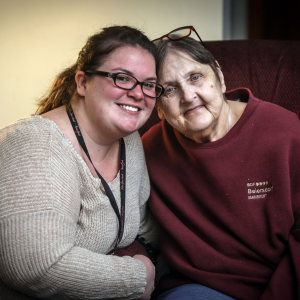
COA manages clients in two home-based Ohio Medicaid waiver programs – PASSPORT and MyCare Ohio – and the Assisted Living Waiver (ALW), which permits clients to live in an assisted living setting when they need more support than in-home services can provide, but don’t require nursing home care. The home-based programs provide older adults with long-term care services such as care management, home-delivered meals, housekeeping, transportation and more. ALW clients receive care management through COA and other services through the assisted living facility where they reside.
The most common way for individuals in southwestern Ohio to begin enrollment in a Medicaid waiver program is by contacting COA. “Usually when people come through the front door there’s been a crisis,” said Terri Bunting, COA’s vice president of managed care. “For example, they’ve lost their primary caregiver and need help.”
The “front door” is COA’s Aging and Disability Resources Center (ADRC), which is comprised of call center specialists, assessors and staff who specialize in managing various activities and records related to clients applying for Medicaid or already on Medicaid.
“This is a critical time when people come through the front door; we’re getting them stabilized with all the services they need to be safe in their home or in an assisted living environment,” Bunting said.
ADRC also assists in situations that are not quite as critical, such as when COA clients enrolled in a non-Medicaid program have an income or asset change that requires them to move to a Medicaid program.
Thus begins the journey to the waiver program where a client will remain for the long term. Applicants must first apply for Medicaid. ADRC specialists determine whether they are within income and asset limits and if they are, send information to the county department of job and family services (JFS) to begin the formal application process. A COA assessor visits the applicant where they live to determine if their care needs meet waiver requirements.
A Medicaid enrollment specialist (MES) from ADRC then takes over, coordinating activities needed to secure Medicaid approval. This includes everything from working with families to start the application process to coordinating with physicians or guardians. The MES follows the progress of the application, checking in every two weeks in the JFS system for a status update.
While waiver program applicants who live in a home (some ALW applicants are already in assisted living but have exhausted their own funds to pay for it and need assistance) wait for Medicaid approval from JFS, they may be enrolled for up to 90 days in Ohio’s state-funded PASSPORT program, a non-waiver program in which they become eligible for the full range of home-based services provided through PASSPORT waiver.
Once approved for Medicaid by JFS, PASSPORT applicants are enrolled and assigned a COA case manager and ALW applicants are enrolled in the program once they begin residing in a Medicaid-certified room at an assisted living facility that accepts the waiver. They, too, are assigned a COA case manager.
This is when the clock starts ticking down to state notification to COA that an individual enrolled in one of the waivers must be migrated to MyCare Ohio, because they have been identified as also eligible for Medicare (the federal health insurance program for those 65 and older) and meet other MyCare requirements.
In MyCare, a managed care organization administers long-term care and healthcare services for those who qualify for both Medicare and Medicaid. Molina Healthcare of Ohio and Aetna Better Health of Ohio contract with COA to manage long-term care-related assessment and services for their clients in southwestern Ohio.
Eighty percent of clients who COA migrates to MyCare spend only about 3.5 months enrolled in PASSPORT or ALW. “This causes a lot of churn,” Bunting said. “Coordinating all of this between departments takes a lot of effort.”
During 2023, COA migrated to MyCare 310 PASSPORT clients and 145 ALW clients.
This constant movement of clients between programs can also pose challenges for the COA team and the client. Sometimes the companies providing services through one program don’t provide them through another. Every detail requires close and consistent tracking and record keeping by COA staff. Medicaid specialists who work in ADRC ensure client records are transferred between programs properly. And care managers must spend time transitioning the client to a care manager in the new program who will manage their services.
“The process of getting people set up in PASSPORT or the Assisted Living Waiver, and then migrating them to MyCare Ohio is complicated for us,” Bunting said. “So, imagine how difficult it can be for a 75-year-old individual who’s not feeling well and is not tech savvy.”
Fortunately, those who find themselves on the Medicaid waiver journey have the COA team behind them.
“The ADRC team is highly experienced and equipped to work with clients in all different stages of their Medicaid waiver journey,” said ADRC Manager Lindsay Hamm.
Likewise, case managers in all waiver programs work to ensure clients are receiving the right services in the right amount at the right time, no matter which program they are enrolled in.
Community-based partnerships bring health and wellness programs to older adults and caregivers
Council on Aging (COA) offers a variety of free health and wellness programs designed with older adults and caregivers in mind. According to the National Council on Aging, approximately 80% of older adults have at least one chronic disease – and 77% have at least two – which require ongoing medical attention and may impact an older adult’s ability to perform everyday activities and limit their independence.
COA’s workshops are offered at community-based locations (host sites) across its five-county service area, making it easy for older adults and caregivers to participate close to home. While each program curriculum is different and designed to meet a specific need, all programs share a common goal: to help older adults and caregivers better manage their own health. COA currently offers seven types of workshops, each focused on a specific issue or need (fall prevention, chronic disease management, etc.).
“Our health and wellness programs have a positive impact on participants’ lives, improving health outcomes and enhancing quality of life,” said Judy Eschmann, COA’s vice president of community and new business operations. “Our secret sauce is our relationship with our host sites. By partnering with organizations in our community that already have a base of members or participants, we extend our reach and impact the lives of even more than we could working alone.”
COA provides a trained facilitator(s) and program materials for each host site. Currently, there are 21 host sites, including health care organizations, YMCAs, faith-based organizations, senior centers and senior housing buildings. Together, host sites and COA offered 33 workshops during FY 2023.
Trinity Lutheran Church in Mt. Healthy is one such host site. “We began hosting COA health and wellness workshops in 2018,” said Norah Bertschy, parish nurse. “We have been blessed with the support of the COA team providing technical support, supplies and encouragement; not to mention the attention to training and updates. We have been able to provide life-changing information and support to our congregation and beyond.”
2023 a big year for recognition of COA innovation
Council on Aging (COA) and its team members were recognized for their work during the 2023 fiscal year by the following organizations:
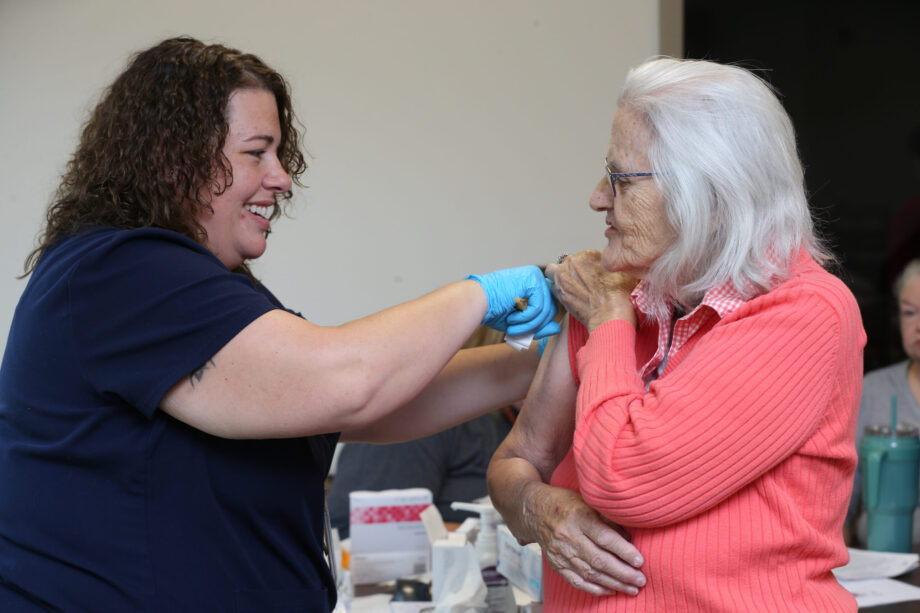
USAging Vaccination Grant – In 2023, Council on Aging received funding from the USAging-led Aging and Disability Vaccination Collaborative (ADVC) to conduct activities aimed at connecting older adults and people with disabilities to COVID-19 and flu vaccines. Led by USAging and funded by the U.S. Administration for Community Living, the ADVC grants help communities stay healthy by targeting older adults and people with disabilities, particularly those from historically marginalized and underserved communities in which vaccination rates are low. Read More
Cigna Foundation Health and Wellbeing Grant – Council on Aging received a Cigna Foundation Health and Wellbeing Grant to support older adults who are socially isolated by providing opportunities for social connectedness through both virtual and in-person activities. The grant provided home52 Transportation services to medical and non-medical appointments; connections to local senior centers; Animal Companion Counseling; access to virtual programming for older adults; and connections to Meals on Wheels programming.
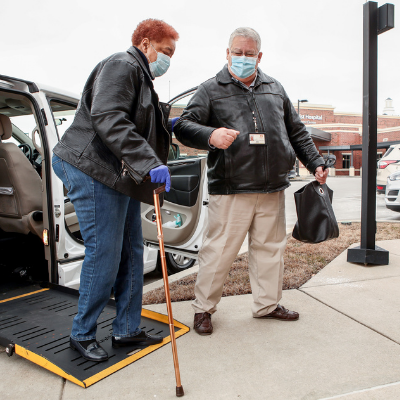
Federal Transit Administration 5310 Funding – Council on Aging and its subsidiary home52 received federal funding to improve mobility for older adults and individuals with disabilities by removing barriers to transportation services and expanding transportation options. The funding supports home52 Transportation, which manages multiple transportation providers through a centralized transportation coordination system, providing specialized, on-demand and advance-scheduled trips for older adults and people with disabilities. Read More
Cincinnati PRSA Blacksmith Award – Council on Aging and its partner, Vehr Communications, received a 2023 Public Relations Society of America Blacksmith Award in the Integrated Communications category for a marketing campaign to promote COA’s innovative homecare matching app, AddnAide. The Blacksmith Awards honor the best of the Cincinnati region’s public relations community, from talented, experienced practitioners to stellar work that has local, national and international impact.
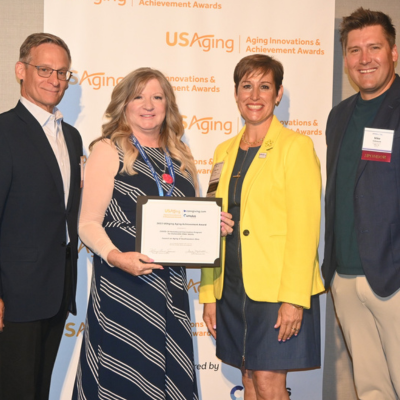
USAging 2023 Aging Innovations and Achievement Awards – Council on Aging’s COVID-19 Homebound Vaccination Program for Vulnerable Older Adults was selected as a recipient of a 2023 USAging Aging Achievement Award in the Public Health & Vaccinations category. The award was presented at USAging’s Annual Conference and Tradeshow in July. USAging annually identifies and showcases members’ innovative and successful programs to encourage their replication by other agencies. The awards recognize programs that exemplify innovation and sound management practices. Read More
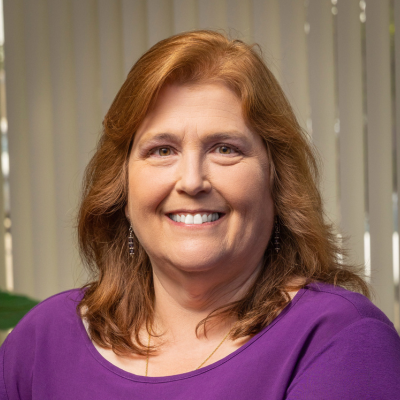
Mom’s Meals USAging Community Champion Award 2023 – In June, Council on Aging Case Manager Theresa Bracher, LSW, was selected as the Mom’s Meals USAging 2023 Community Champion. This national award honors long-term care case managers for their outstanding achievements in the areas of nutrition, health and healthy lifestyles. The award underscores the value of the case manager’s role in supporting whole health in their communities and promotes awareness of the importance of nutrition in overall health — particularly to reduce the impact of social determinants, to support individuals who want to age at home, and to support the management of chronic conditions. Read More
Association for Professionals in Aging Project of the Year Award – In March, Council on Aging’s Vice President of Program Operations Ken Wilson received the TriState chapter of the Association of Professionals in Aging’s (APA) Project of the Year Award for the Homebound Vaccination Program. Read More

Leadership Council for Nonprofits VUCA Award – Council on Aging Senior Innovation Designer Jai’La Nored received the 2023 VUCA Leadership Award from the Leadership Council for Nonprofits in March. The award recognizes an early-career leader in the Greater Cincinnati nonprofit sector who is positively impacting their organization and the community through demonstrated vision, understanding, clarity and agility in a VUCA (volatile, uncertain, complex and ambiguous) world. Read More
HUD Older Adults Home Modification Program – In April, Council on Aging was awarded a $1.25 million grant from the U.S. Department of Housing and Urban Development’s (HUD) Older Adults Home Modification Program. The program aims to enable low-income older adults to remain in their homes through low-cost, low barrier, high impact home modifications to reduce their risk of falling, improve general safety, increase accessibility, and improve their functional abilities in their home. Council on Aging will use the funding to assist low-income older homeowners in Clinton County. Read More

2023 AARP Community Challenge Grant – In June, home52 Transportation, a service of Council on Aging (COA) subsidiary home52, received a 2023 AARP Community Challenge Grant. home52 Transportation was one of only 310 grantees nationwide (out of 3,600+ applications). The $35,168 grant was in the Transportation Systems Change Demonstration category, which is supported by Toyota Motor North America. The AARP grant provided funding for the development of educational tools to help older riders access and use an online scheduling platform, including step-by-step videos and printed guides, as well as in-person education sessions for those who require additional assistance. Read More

